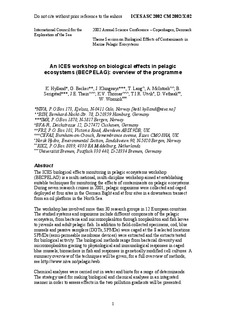An ICES workshop on biological effects in pelagic ecosystems (BECPELAG): overview of the programme
Hylland, Ketil; Becker, Gerd; Klungsøyr, Jarle; Lang, Thomas; McIntosh, Alistair; Serigstad, Bjørn; Thain, John E.; Thomas, Kevin V.; Utvik, Toril Inga Røe; Vethaak, Dick; Wosniok, Werner
Original version
This report is not to be cited without prior reference to the authorsAbstract
The ICES biological effects monitoring in pelagic ecosystems workshop (BECPELAG) is a multi-national, multi-dicipline workshop aimed at establishing suitable techniques for monitoring the effects of contaminants on pelagic ecosystems. During seven research cruises in 2001, pelagic organisms were collected and caged deployed at four sites in the German Bight and at four sites in a downsteam transect from an oil platform in the North Sea.
The workshop has involved more than 30 research groups in 12 European countries. The studied systems and organisms include different components of the pelagic ecosystem, from bacteria and microzooplankton through zooplankton and fish larvae to juvenile and adult pelagic fish. In addition to field-collected specimens, cod, blue mussels and passive samplers (DGTs, SPMDs) were caged at the 8 selected locations. SPMDs (semi-permeable membrane devices) were extracted and the extracts tested for biological activity. The biological methods range from bacterial diversity and microzooplankton grazing to physiological and immunological responses in caged blue mussels, biomarkers in fish and responses in genetically modified cell cultures. A summary overview of the techniques will be given; for a full overview of methods, see http://www.niva.no/pelagic/web.
Chemical analyses were carried out in water and biota for a range of determinands. The strategy used for making biological and chemical analyses in an integrated manner in order to assess effects in the two pollution gradients will be presented.
